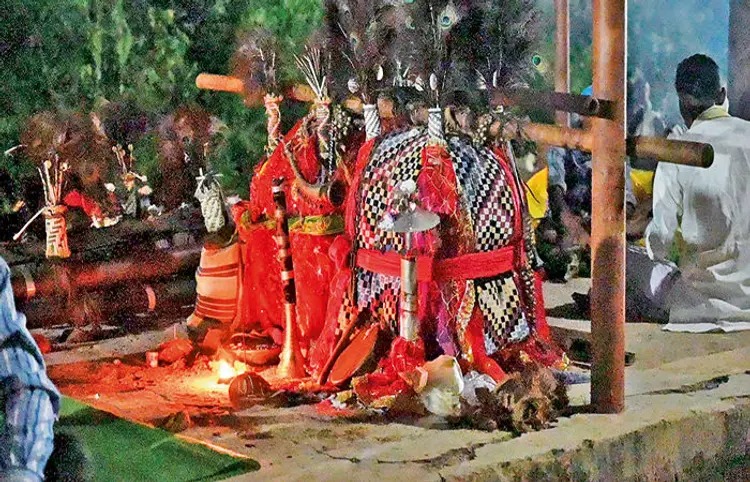
The tribal-dominated Bastar region of Chhattisgarh is often in the news because of the Naxalites and their courts. In these courts, the Maoists punish those who work against them. However, there is another court in Bastar, which meets once a year and the gods and goddesses are not excluded from its decision. This court, set up in the temple, convicts and punishes the gods and goddesses. In this court, villagers appear as prosecutors, leaders as lawyers and roosters as witnesses. This tradition firmly believes that there should be mutual responsibility in the relationship between gods and humans.
A unique court has been set up in Keshkal in Kondagaon district of Bastar division, about 250 km from Chhattisgarh's capital Raipur. A unique tradition is performed at the Bhangaram Devi temple during the Bhado Yatra festival in the tribal-dominated area of Bastar.
A public court is held here where the deities are tried and sentenced. This Divya Darbar reveals the reciprocal relationship between devotees and deities in which the deities are expected to fulfil their duty of providing protection and comfort to their devotees. If the deities fail to listen to the prayers of the devotees or avert a calamity, they are accused and tried.
During this three-day festival, the temple deity Bhangaram Devi becomes the judge of the case with the village leaders appearing as lawyers and roosters as witnesses. The deities are given severe punishments such as banishment from the temple or symbolic imprisonment of their idols in the backyard or under a tree. It is said that the village head who pronounces the verdict speaks as per the instructions of the goddess.
These cases are not only for punishment but also give the gods an opportunity to atone. If the gods rectify their karma and listen to the prayers of the people, their punishment is forgiven and brought back to the temple.
The entire process is also carefully documented and a register is maintained of each such case containing details of each case, the accused deities, the type of charges levelled against them, witnesses and the final verdict.
The tribals of Bastar have their own deities, many of whom were originally human but were elevated to the status of gods due to their noble deeds. The Bhangaram Devi temple too has a rich history of its own. According to one belief, it was established in the 19th century during the reign of King Bhairamdev. It is said that centuries ago, Bhangaram Devi Maiji, who hailed from Warangal in present-day Telangana, was given land near the Keshkal hills. Maiji and Dr. Khan, who accompanied her, rendered invaluable service to the tribals during the cholera and smallpox epidemics. Since then, Maiji and Dr. Khan have been given divine status. Maiji Bhangaram Devi and Dr. Khan are known as Khan Devta or the Ear Doctor. Villagers take lemons and eggs to the idol of Khan Devta, which is kept along with the idols of other deities in the Bangaram temple.
 look news india
look news india